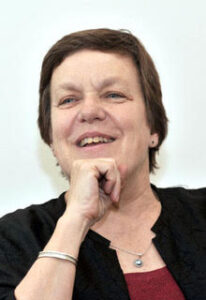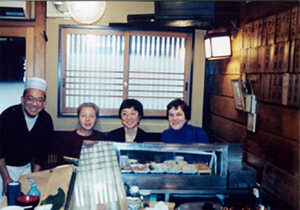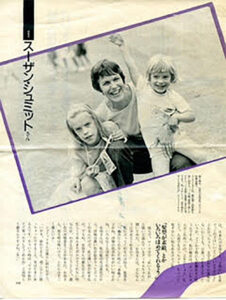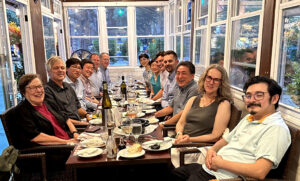JICUF Trustee Interview: Susan Schmidt
 Susan Schmidt, who was appointed as a JICUF trustee in 2018, lived in Tokyo from 1972 to 1996 and worked as a staff editor of English-language books at the University of Tokyo Press. Currently residing in Boulder, Colorado, she is the Executive Director of the American Association of Teachers of Japanese (AATJ), a professional organization of Japanese language educators in the United States.
Susan Schmidt, who was appointed as a JICUF trustee in 2018, lived in Tokyo from 1972 to 1996 and worked as a staff editor of English-language books at the University of Tokyo Press. Currently residing in Boulder, Colorado, she is the Executive Director of the American Association of Teachers of Japanese (AATJ), a professional organization of Japanese language educators in the United States.
JICUF: Please tell us how you ended up working in Japan for so long.
Susan: I went to Japan out of curiosity, not intending to stay more than a couple of years, but I had a background in editing, and once in Tokyo I discovered that there were publishers who were looking for people with my skills to work on English-language books and journals. I ended up working for an academic publisher for more than 20 years, editing and producing books by Japanese scholars who were writing their research in English, as well as translations of Japanese literary works.
JICUF: Please tell us about your memories of Japan, what surprised you, what you enjoyed, struggled with, etc.
Susan: The best part of Japan for me was the amazing community of translators, writers, and editors working between Japanese and English in the 1970s, ‘80s, and ‘90s, who became close colleagues and friends. I am still in touch with many of them, many years after moving back to the U.S.
I also came to know and love Tokyo, which was an exciting and fascinating place to live: its lively central areas, quiet neighborhoods, delicious food, welcoming people, and rich cultural life captivated and inspired me. I raised two daughters in Tokyo, mostly as a single mother, and while I struggled occasionally to fit in with the customs and demands of their school life, I learned so much from Japan’s educational system and its values; those lessons have shaped me in important ways.
I became a serious jazz fan during my years in Tokyo; the “live” music scene there, from big concerts to small clubs, was a delightful discovery and opened a new world to me. Some of my favorite jazz musicians were Ryuichi Sakamoto (his music was in more categories than jazz, but . . .); Tatsuro Yamashita; Terumasa Hino; and Toshiko Akiyoshi, from the “old days” of the 1970s and 1980s. I went to a few concerts and large clubs, but mostly I used to go to small neighborhood jazz clubs, or places that friends recommended or played at themselves.


Photo left: With friends at a sushi restaurant / Right: Interview article in “Travail”, a recruitment magazine for women
JICUF: If you have a chance to go to Japan again, where would you like to visit?
Susan: When I have a chance to travel again to Japan and spend longer, I would like to go to Okinawa (which I never visited when I lived there), and also to Yamagata, because it is the sister prefecture of Colorado, and Yamagata City is the sister city of Boulder, Colorado, where I live now.
JICUF: Please tell us how you became a JICUF trustee.
Susan: Professor Phyllis Larson of St. Olaf College, an ICU alumna and JICUF trustee, asked me if I would be interested in being considered as a member of the JICUF Board of Trustees. I did not attend ICU, but I knew ICU’s reputation as a liberal arts college with an international focus, and the home of some of the teachers whose work I used when I studied Japanese language.
Several of my closest colleagues at the University of Tokyo Press and other publishing companies were ICU alums; most of them were women, who in the 1960s and ‘70s were encouraged at ICU to pursue advanced education and careers in the world of teaching, writing, and publishing. I lived for many years in western Tokyo, and I would often drive or bicycle with my children to Kichijoji and Mitaka and explore Nogawa Koen and the beautiful ICU campus. Since I admired the university so much, I wanted to promote its work and contribute if I could.

Susan (left) with JICUF Trustees and staff, Fall 2023
JICUF: What is your responsibility at JICUF?
Susan: One of JICUF’s projects is a grants program, which offers funding to students, faculty members, and alumni for research and community-focused projects. I am a member of the grants committee, and I review applications for funding from the ICU community. It is inspiring to read about plans for research, advocacy, and community-building that are the subjects of grant proposals, and to have a chance to meet and talk with some of the students and faculty members whose work JICUF makes possible.
JICUF: What do you enjoy the most about being a JICUF trustee?
Susan: I enjoy working with JICUF’s awesome staff and an amazing group of fellow trustees – people from all walks of life who love ICU and are dedicated to the Foundation’s important programs like advocating for refugee students and taking a leadership role in programs that enable students from war-torn parts of the world to get an education at one of Japan’s outstanding universities.
JICUF: I heard that Boulder, Colorado, where you currently live, has a high awareness of nature and environmental protection throughout the city and that residents live in harmony with nature. Please tell us about your life in Boulder and your current work.
Susan: Boulder is surrounded by natural beauty; years ago it purposefully created a large network of “open spaces” in and around it, where industrial development is prohibited. Many residents spend a lot of time hiking, biking, and skiing. It has a large university and a lot of “tech sector” companies, so there is a lot of cultural and intellectual activity as well.
The American Association of Teachers of Japanese’s national office is at the University of Colorado, in Boulder; my work there includes publishing a journal, running professional development programs for Japanese language educators who teach at all levels of instruction, administering the Japanese Language Proficiency Test (JLPT) in the United States, and developing and administering a scholarship program for study abroad in Japan.
Thank you so much, Susan!

Scenery outside Boulder, Colorado



